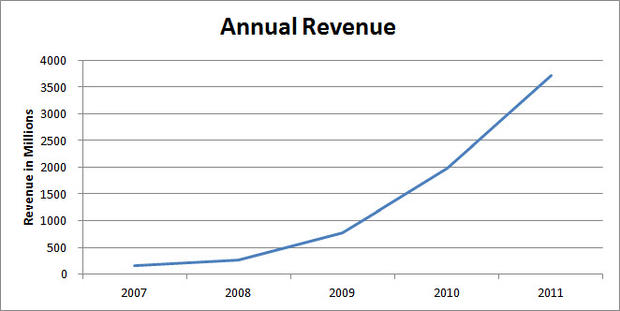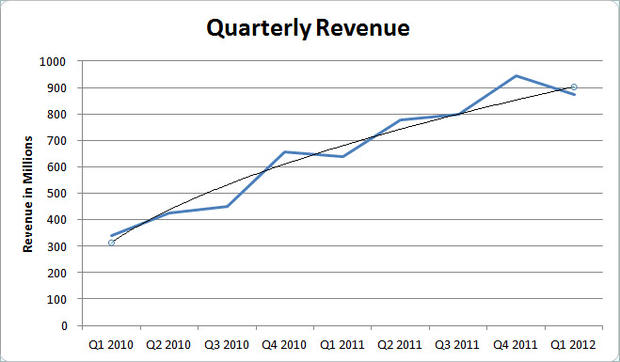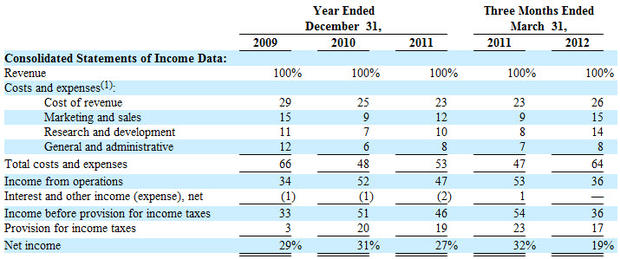5 investor questions for the Facebook roadshow
(MoneyWatch) COMMENTARY Facebook is ready for its IPO, with the Wall Street Journal reporting that the road show starts on Monday and stock trading to begin on the 18th.
Wall Street is excited and chances are that the company will see a valuation at least 20 times greater than its annual revenue.
Facebook has been preparing long and hard for this day. But investors should do the same, as there are some hard questions they should ask the company.
Will the stock structure protect them?
Facebook has created a multi-tiered stock structure that squarely puts Mark Zuckerberg in the driver's seat. Not only is he CEO, but he "controls a majority of our outstanding voting power," as the S-1 filing with the SEC states. Zuckerberg can singly decide any issue that comes before stockholders for approval, including election of directors. That limits the effect independent directors -- those that are not also officers of the company -- can have. Every director is completely beholding to Zuckerberg for the position. It makes the control that Rupert Murdoch has had over News Corp. (NWSA) -- through not only its salad days but the disasters that have piled up in recent years -- look like an Athenian democracy.
What are the revenue prospects?
Facebook has grown revenue like a week, if you look at the numbers from the latest S-1. Annual revenues have climbed one year after the next:
However, on a quarterly basis, the results look different when you see the trend line that has developed:
The company is working hard to increase its revenue-generating mechanisms, but there's no guarantee how they might work and things seem to be slowing. As Larry Dignan noted noted at our sister site CNET, Facebook faces a conundrum:
- It has to ramp up ad delivery to make enough money to justify a high valuation. (Facebook has already begun to increase ad numbers per page.)
- More ads could annoy users.
- Unhappy users might cease to show up as frequently or be less receptive to ads. That would drive down ad effectiveness, making advertisers unhappy as well.
- Poorer results might send advertisers and their money elsewhere. (Some have already begun to wonder whether Facebook ads are worth the money.)
Dignan's conclusion: "Simply put, it's quite possible that Facebook may not be a monetization machine like Google."
How much profit can Facebook make?
Even if a company is investing in long-term growth and market dominance, eventually everything comes down to profits. Facebook has developed a vague reputation of being very profitable, but as more financial data comes to light, the trend looks as though profit levels are on a declining trend. Here is a table from the S-1 that shows categories in the income statement as percentages of revenue:
The first quarter of 2012 shows a steep drop from historic levels. Lest you think this might be a normal seasonal anomaly, net income represented 32 percent of revenue in the first quarter of 2011, rather than the 19 percent this year.
What's a reasonable valuation?
Facebook and its investors are determined to push for higher valuations because it lets the original backers make a bigger profit on their investment. But analysts don't necessarily agree. Pivotal Research Group analyst Brian Wieser sees the company's value as distinctly lower than the numbers being tossed about, as Dignan quoted:
First quarter results suggest operating margin challenges, reducing enterprise valuation from $82 billion to $75 billion...We now must incorporate into our model new concerns around operating expense management, especially given the diminishing growth in the overall business during the quarter.Another potential concern relates to the pace of deceleration in the United States. We estimate growth of advertising revenue was likely in the low double digits in the U.S. during the first quarter. By contrast, international advertising was likely very robust, growing by more than 60% per our estimates during the same period.
Facebook has increased its monetization of users from $3.08 per year in 2009 to $5.11 in 2011. But user growth is slowing in its older markets, while users in newer emerging markets have lower average revenue per user (ARPU) than established ones. Absent new methods to make incremental revenue, that will mean a dropping off of ARPU, especially when North America no longer contributes more than half the company's sales, as has been true through 2011.
Furthermore, as Antone Gonsalves argues on ReadWriteWeb, Facebook is really a media company and not a technology company. As that becomes clear to many, expectations and demands will change. The multiples now accepted may look over reaching.
Could someone still make quick money from Facebook's stock?
This is a question that separates the big institutional investors from individuals that aren't well-connected. With enough hype, institutions that get to purchase the stock at initial IPO prices (or that were early investors that bought at considerably lower price points) will be able to ride a wave of frenzy and sell off enough of their holdings to make a solid profit and still keep shares in hand.
Individuals would have to depend on day trader-like reflexes to catch the stock out of the gate and then to flip it as the price rises. It's a dangerous game and one that can leave people losing money as well as winning. That said, if you really want to make money from Facebook stock, see whether your holdings in an institution that might get an early in.


